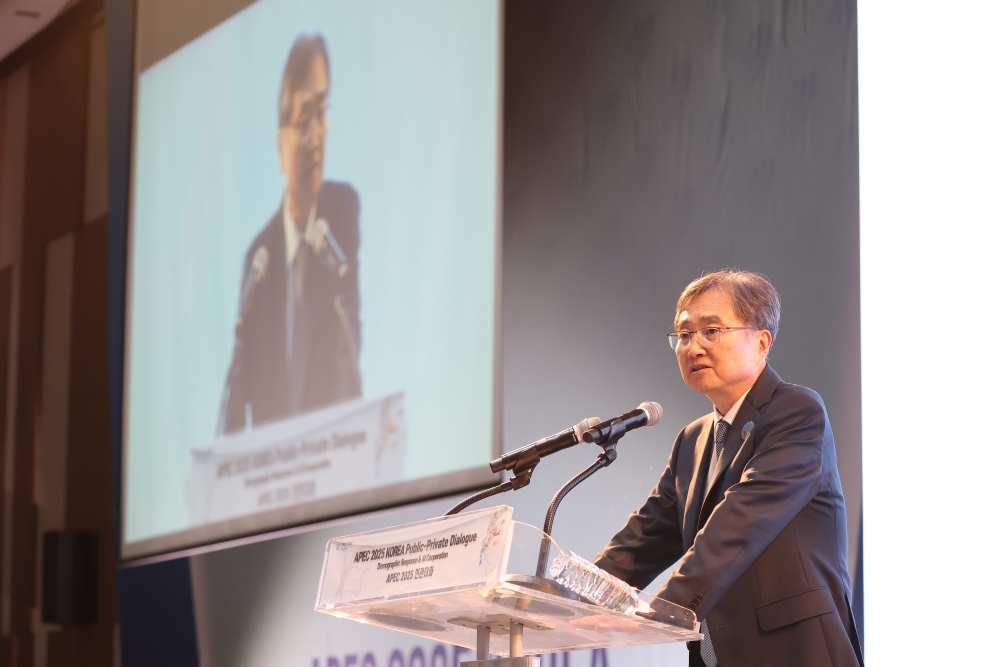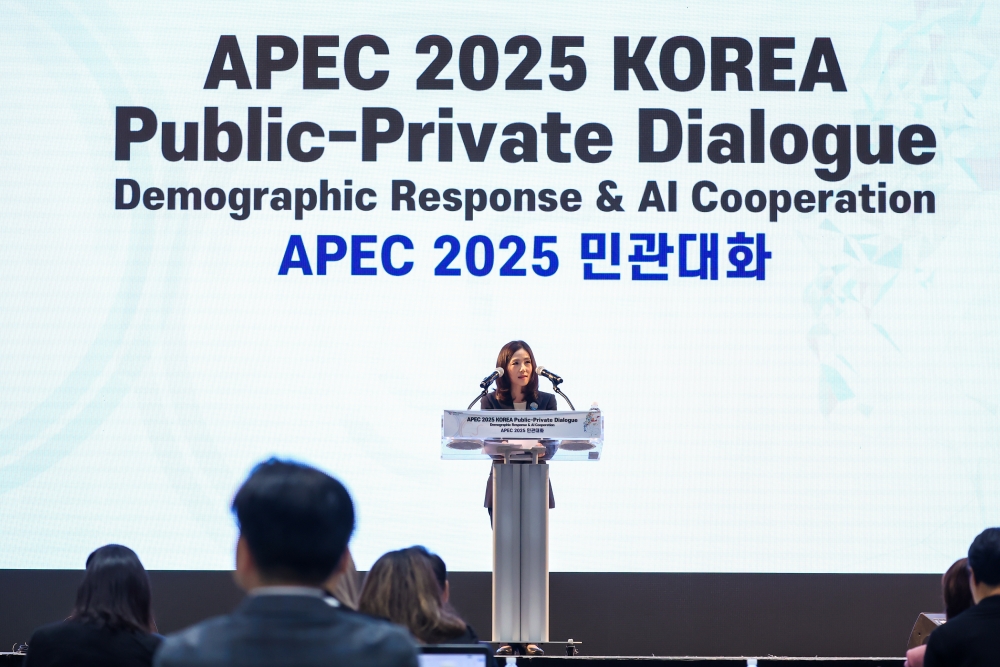-
About the Ministry
About the Ministry
- Press
- Countries & Regions
- Policy Information
- Life In Korea
Ministry News
- Notices
- Ministry News
- Press Releases
- Press Briefings
- Speeches & Published Materials
- Newsletter Service
- Diplomatic White Paper
Responding to Demographic Changes and AI Transformation through Robust Public-Private Collaboration
- Date
- 2025-08-12
- hit
- 2249

- APEC 2025 Key Deliverables Discussed at “APEC 2025 Korea Public-Private Dialogue” -
The Ministry of Foreign Affairs hosted the “APEC 2025 Korea Public-Private Dialogue” in Songdo, Incheon, on August 11-12. Public-Private collaboration has long stood as a defining tradition and strength of the Asia-Pacific Economic Cooperation (APEC), ensuring that the active engagement of businesses and academia helps translate inter-governmental policy discussions into tangible outcomes applicable on the ground.
The event featured vibrant discussions on “Demographic Changes, from Crisis to Innovation” on August 11 and “Building a Sustainable Tomorrow with Artificial Intelligence (AI)” on August 12.

Minister of Foreign Affairs Cho Hyun delivered welcoming remarks and Vice Minister Kim Jina opening remarks, followed by congratulatory remarks by Mayor Yoo Jeong-Bok of Incheon, the host city of the Third Senior Officials’ Meeting and Related Meetings (SOM3) of APEC 2025. The dialogue brought together representatives from public and private sectors of APEC member economies as well as experts from international organizations such as the Organisation for Economic Cooperation and Development (OECD) and the World Bank. During the two-day event, more than 300 people, including APEC Senior Officials’ Meeting (SOM) delegates and business representatives, took part in the discussions.
In his welcoming remarks, Minister Cho underscored that “AI is already reshaping economies, societies and the way we live, and the Korean government has placed AI transformation at the center of its policy agenda.” He added that through the “APEC AI Initiative,” a key deliverable of APEC 2025, Korea seeks to advance AI transformation through strategic planning, strengthen AI capacity across all sectors, and develop AI infrastructure with private sector investment.
Vice Minister Kim noted in her opening remarks that “In the face of the world’s lowest birth rate and a rapidly aging population, the Korean government is implementing a holistic, long-term strategy that goes beyond conventional measures including the development of an integrated care system, stable economic participation for women, and a phased extension of the retirement age.” She stated that, through this year’s “Collaborative Framework for Demographic Changes,” Korea will address demographic changes as a structural issue for the region and support APEC economies in developing strategies that reflect their domestic contexts. She further emphasized the importance of consistently incorporating voices of younger generations, who will be the direct beneficiaries of today’s policy decisions.
In his congratulatory remarks, Mayor Yoo highlighted Incheon’s efforts to implement practical policies and expressed his hope that the city’s policy innovations and achievements would serve as a valuable source of inspiration for the APEC community.
In her keynote speech on demographic changes, Dr. Jennifer Sciubba, President & CEO of the U.S. Population Reference Bureau, suggested strengthening domestic workforces through enhanced people-to-people exchanges and expanded caregiving services. Mark McCrindle, social researcher & Principal of McCrindle Research, emphasized the importance of cultivating talent in ways that reflect characteristics of younger generations accustomed to digital technologies. Finally, Dr. Willem Adema, senior economist in the Social Policy Division at the OECD, presented a comprehensive policy agenda, including the creation of age-friendly workplaces and the expansion of lifelong learning opportunities.
During the keynote session on AI, Dr. Guy Ben-Ishai, head of Economic Policy Research at Google, delivered a presentation on “AI and the Opportunity for Shared Prosperity,” highlighting AI’s potential to drive economic growth. Sung Kim, CEO of Upstage, shared his vision for the future of work in the era of AI, while Karine Perset, acting head of the AI and Emerging Digital Technologies Division at the OECD, outlined the OECD’s policy recommendations on international cooperation to harness AI for economic development.
In addition, young adults, selected to speak at the event through a public contest held from May 30 to June 30, offered their fresh perspectives: They proposed the development of a Youth Livability Index to identify areas of need for the youth amid demographic changes, called for institutional frameworks enabling youth to participate in the development of AI technologies as their active designers and urged efforts to bridge the digital divide in the Asia-Pacific region.
The APEC 2025 Korea Public-Private Dialogue provided an opportunity to share constructive and balanced policy recommendations, practical measures, and younger generations’ perspectives on APEC-wide responses to demographic changes and cooperation on AI. Building on the private sector’s strong commitment to engagement and cooperation demonstrated at the dialogue, the Ministry of Foreign Affairs will continue discussions with the APEC economies and the private sector on the key deliverables of APEC 2025 to facilitate their adoption at the APEC Economic Leaders’ Meeting as its outcome document.




